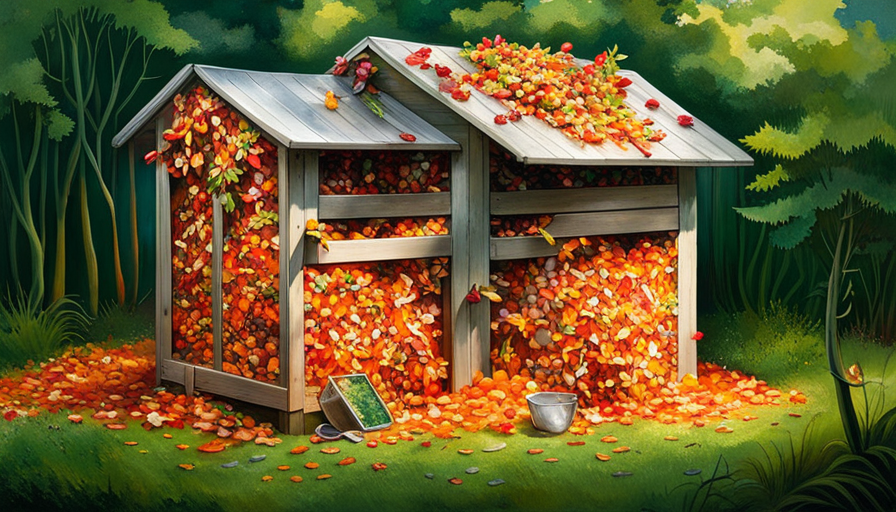Have you ever wondered if you can compost jello? Composting is an eco-friendly way to dispose of organic waste and create nutrient-rich soil for your garden. However, not all materials are suitable for composting. So, what about jello?
To answer this question, it’s important to understand the composting process and the ingredients in jello. Composting involves breaking down organic matter into a nutrient-rich soil amendment through the action of microorganisms. Jello, on the other hand, contains gelatin, sugar, artificial flavors, and colors – all of which may affect the composting process.
In this article, we’ll take a closer look at whether or not you can compost jello and what factors you should consider before doing so.
Key Takeaways
- Jello is not suitable for composting due to its slow biodegradability and the resources required for its production.
- Meat and dairy products, including gelatin, should not be added to compost bins.
- Gelatin-free Jello options can be composted.
- Leftover Jello can be repurposed as a topping or ingredient in other foods to reduce waste.
Understanding the Composting Process
Composting involves breaking down organic matter into nutrient-rich soil through a combination of heat, moisture, and bacteria. It’s an excellent way to reduce waste and create a sustainable source of fertilizer for your garden.
Composting benefits the environment by diverting food scraps from landfills and reducing methane emissions. Plus, it enriches soil with essential nutrients that can help plants grow healthier and stronger.
However, composting also presents several challenges that you should be aware of before getting started. For instance, it requires the right mix of green (nitrogen-rich) and brown (carbon-rich) materials to ensure proper decomposition. You’ll need to balance water levels carefully too; too little moisture will slow the process down, while too much can cause odors or attract pests.
Additionally, some materials like meat or dairy products should not go in your compost bin because they could attract rodents or release harmful pathogens into the soil.
Analyzing the Ingredients of Jello
When making the decision to dispose of leftover jello, it’s important to take a closer look at its ingredients.
Jello is made up of several components, including sugar, artificial flavors and colors, and gelatin. Gelatin is a protein derived from animal collagen that gives jello its signature texture.
However, the gelatin composition in jello can have an environmental impact when disposed of improperly. The production of gelatin requires large amounts of water and energy, as well as the use of chemicals such as sulfuric acid.
When thrown away in landfills, jello can contribute to methane emissions which are harmful to the environment. It’s important to consider composting as an alternative method for disposing of leftover jello in order to reduce its negative impact on the environment.
- Sugar
- Artificial flavors and colors
- Gelatin
- Chemicals used in production
Factors to Consider Before Composting Jello
Before burying any bits of jiggly jelly, it’s crucial to carefully consider specific factors.
The composition of Jello should be one of your primary concerns. It’s necessary to note that Jello is made with gelatin, sugar, artificial flavoring, and food coloring. While these components are biodegradable in nature, they won’t break down quickly enough for composting purposes.
Another factor to consider before composting Jello is its environmental impact. When you throw away food waste that can’t decompose entirely in a compost pile, it ends up in landfills where it releases methane gas into the environment. Methane gas has a significant contribution to global warming and climate change.
Therefore, if you decide to compost Jello scraps or leftovers at home, make sure to add them only in small amounts and mix them thoroughly with other organic materials before adding them to your compost pile or bin.
Alternatives to Composting Jello
If you’re looking for eco-friendly ways to dispose of your Jello leftovers, there are a few options available to you.
One alternative is to choose gelatin-free Jello options that are made with plant-based ingredients. These types of Jello can be composted because they break down naturally and won’t harm the environment.
Another option is to find edible food waste solutions for your leftover Jello. You could use it as a topping for yogurt or ice cream, mix it in with smoothies, or even make fruity popsicles out of it.
By reusing your Jello in this way, you’ll be reducing food waste and getting more creative in the kitchen at the same time!
So next time you have leftover Jello, don’t just throw it away – try one of these alternatives instead.
Frequently Asked Questions
Can you use expired jello for composting?
You can reduce food waste by using expired food for composting. However, jello is not recommended as it contains artificial ingredients that may harm the soil and its inhabitants.
Will adding jello to compost attract pests?
Did you know that composting with jello can reduce landfill waste by up to 30%? To prevent pest infestation and manage odor, mix jello with other organic materials and turn your compost regularly. Try it out!
Can you use sugar-free jello for composting?
"Instead of tossing out expired sugar-free jello, consider using it as a plant fertilizer or adding it to your garden soil. However, avoid using artificial sweeteners in composting as they can harm beneficial microbes."
How long does it take for jello to decompose in compost?
Jello has a slow decomposition rate in compost due to its gelatinous nature. Its high sugar content can also attract pests and disrupt the balance of microorganisms in the compost, negatively impacting the environment.
Can you compost jello cups or do they need to be removed?
Are you short on space for composting? Jello cup alternatives like reusable silicone molds are perfect! But, when it comes to composting in small spaces, remove the jello cups as they may not break down properly.

